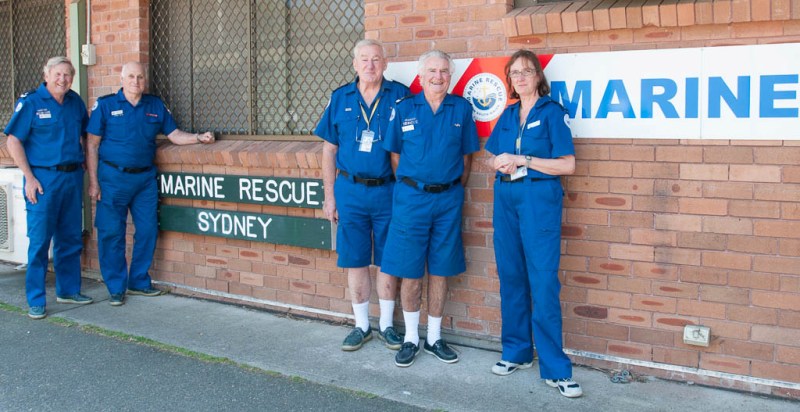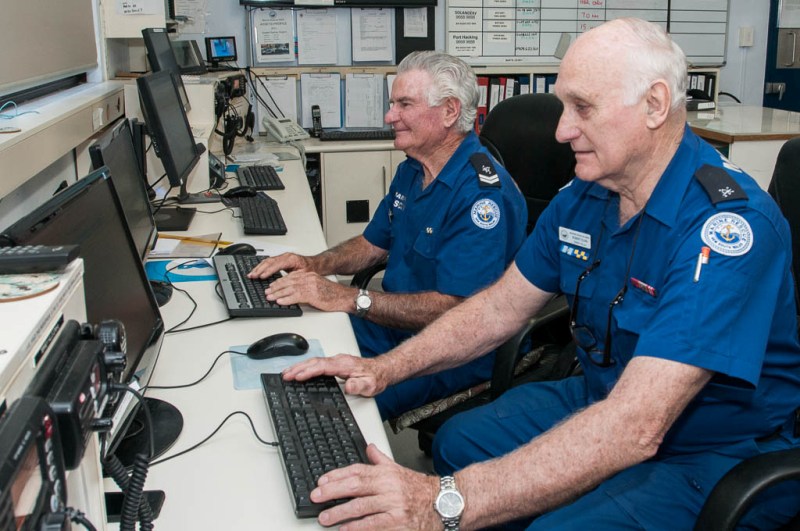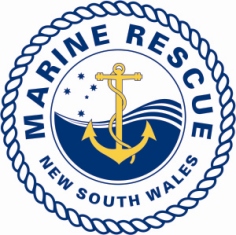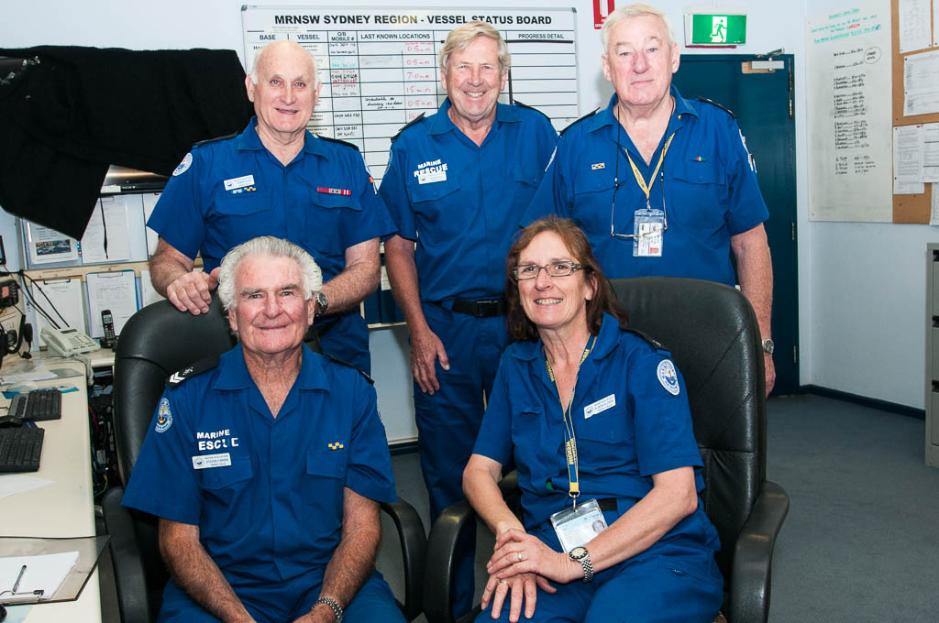November 10 - 16, 2013: Issue 136
Marine Rescue Sydney - Terrey Hills - the Radio Base
www.maritime.nsw.gov.au
Marine Rescue Sydney is a 24 hour, 7 days a week radio base at Terrey Hills. It is run completely by volunteers ( approximately 70) and provides radio support to boats throughout Sydney.
Our radio base volunteers monitor the airwaves for boaters in need of rescue or less urgent assistance. Our radio safety net includes a Log On and Log Off service for boaters, who are encouraged to let their local Marine Rescue unit know when they are heading out on the water, where they are headed and when they plan to return. If they do not Log Off when expected, action can be promptly taken to locate them.
When a boat is undertaking a journey, they can log on with Marine Rescue for the duration of their voyage be it going fishing for the day or sailing up to Lake Macquarie, or elsewhere. Our radio operators take all the necessary particulars including the number of people on board, the type of vessel, where they are going and an estimated time of arrival at their destination and contact details.
In the case of an emergency we liaise with the Water Police.
The Terrey Hills base is part of Marine Rescue NSW which has bases all along the coast. There are over 3,000 members manning 46 units. In the Pittwater area there are also bases at Broken Bay, Cottage Point and Hawkesbury which provide on-water support.
VHF Marine Radio Repeaters have been installed in some areas. These help channel communications over a larger area and can have a range of up to 50 nautical miles to sea. Training courses for the MROVCP or MROCP licence explain the operation of VHF repeaters, how and when they should be used and when NOT to use them.

Marine repeaters are installed purely to enhance safety at sea. Radio traffic through the repeaters must only be of a “safety communications” nature, such as radio checking, position reporting, offshore transit progress, weather observations and forecasts, Log On and Log Off messages and emergency traffic. Repeaters should only be used once contact with a shore-based station is made and vessels are instructed to change to a repeater channel.
Repeaters MUST NOT be used as “chatter channels”, as this can interrupt urgent safety message handling and is illegal under the ACMA legislation. It is good boating practice to teach these basic principles of marine radio to others who go boating with you. Better still, encourage them to enrol with you in a Marine Radio Operators Certificate of Proficiency course.
Always keep your marine radio on the ‘Distress, Safety and Calling’channel. On VHF sets this is Ch 16 and on 27MHz radios, it is Ch 88. Because of prevailing conditions you may be the only ship station that picks up an emergency call from another boat. Many radios allow you to set up a dual watch or scan mode to also monitor other channels, such as a local repeater, or a ship-to-ship channel. See radio courses for more information on the effective use of these modes.
If you need information or assistance while you’re out on the water, use the appropriate ‘Distress, Safety and Calling’ channel to call your local Marine Rescue radio base. You will then be asked to go to a “Working” channel. The Duty Operator will advise which channel to change to.
Be sure to listen for any other radio traffic before making your call, otherwise you might not be heard or you could interrupt another user’s transmission. Speak slowly and clearly.
When making an initial call, state the call sign of the Marine Rescue radio base you are calling three times and your own call sign three times. This is to help ensure the coast station knows you are calling them and who you are. Marine Rescue NSW call signs and listed on the find a unit map
For example, if you make a call on VHF Ch16:
You: “Marine Rescue Sydney, Marine Rescue Sydney, Marine Rescue Sydney. This is (name of your boat) Firecracker, Firecracker, Firecracker. Over”
The Marine Rescue shore station will respond and ask you to go to a "Working’’ channel.

The Terrey Hills unit is always looking for new recruits. Volunteers don't need any boating or radio experience as they undergo extensive training. There are people from all walks of life who give up their time to operate the radios.
Marine Rescue receives a small amount of government funding but relies heavily on fundraising and donations. More information can be found on www.marinerescuensw.com.au
What would you recommend anyone taking their boat out for an extended period do prior to departure?
We have a comprehensive flyer of things to check. For the inexperienced good reference would be to compare to a long overland car journey. Boating Safety is of course the priority. All the information needed for safe boating is in the Roads and Maritime Services Boating Handbook. This is available from their website at www.maritime.nsw.gov.au. The handbook provides information on equipment that must be carried on board, the NSW lifejacket laws and the requirements for NSW boat licences.
Here are some good tips to follow when planning a boating trip:
Check your boat is in good condition and is seaworthy
Inspect the bilges. If there is more bilge water than usual, find and rectify the fault
Have an appropriate anchor and chain on board that are rigged ready to use
Check the weather before going out. A good site is Marine & Ocean on the BOM website www.bom.gov.au
Check all the required safety equipment is on board, that it is in good condition and the crew know where it is located on the boat. Have a life jacket for each person on board. Children require suitably sized life-jackets. Know when to wear a lifejacket
If going offshore, make sure your marine radio is working and that you know how to use it in an emergency
Make sure there is sufficient fuel and fresh water for the planned trip
Do not drink and drive. The legal limit on the water is 0.05% as on the roads
Tell someone where you are going and when you are expected home
Don’t overload your boat
What sort of training would any volunteer wishing to join your unit need to undertake?
Training involves comprehensive understanding of marine communication and protocols. Initial training is 6 months then trainee position in radio room. We never stop learning!
What fundraising activiites do you have coming up that people may participate in?
We run BBQs at Bunnings - Belrose. We also run an annual raffle - top prize is a Quintrex boat package. We also have MRSS - Marine Rescue Safety Service whereby we keep info on boat owner and vessel for $65 p/a. he State Government provides a small allowance. Warringah Council provides our building facility and its upkeep.
What is the best part about being involved with Marine rescue?
Meeting people from wide variety of backgrounds, learning, camaraderie, service to community, satisfaction. "Going home with a grin on my face although I don't get paid!"
What is your motto?
SOLAS - Safety of life at sea

Marine Rescue Sydney Radio Details
Radio for help on
Channel 16 on VHF (distress and calling channel)
Channel 88 (27.880 MHz) on a 27 MHz radio
Call MRNSW on 9450 2468 Or Call 000
Marine Rescue Sydney
Terrey Hills Unit
Thompson Drive, Terrey Hills
Telephone; 9450 2468
Email; Terreyhills@marinerescuensw.com.au
See Map Click address; http://goo.gl/maps/Blak

Marine Rescue Sydney – Terrey Hills Unit members: Front (left to right): Steve O'Brien and Alison Glover. Standing left to right: Robert Elvin, Colin Ravenhall and Andrew Topp. Picture by Michael Mannington.
Copyright Marine Rescue Sydney, 2013.